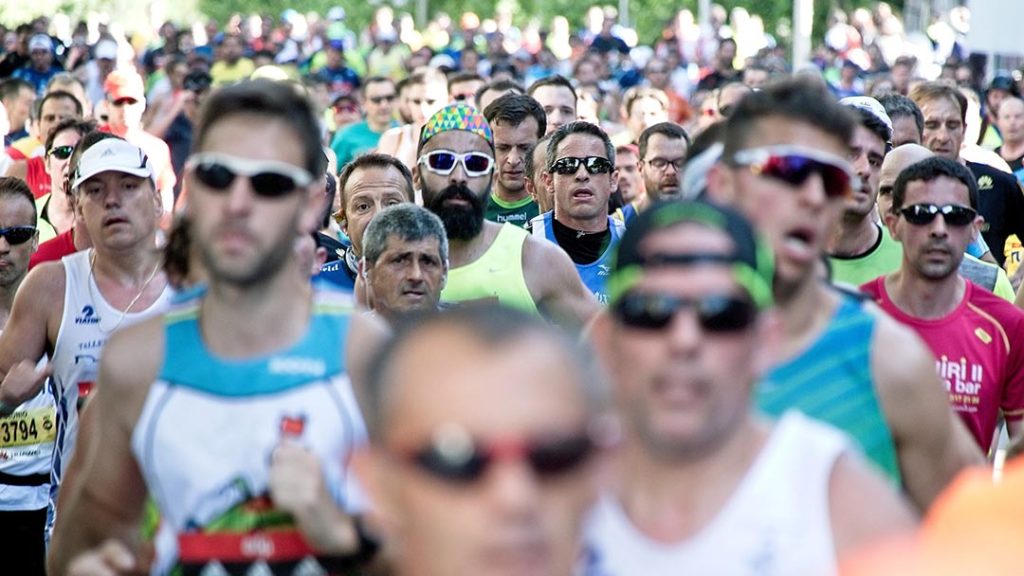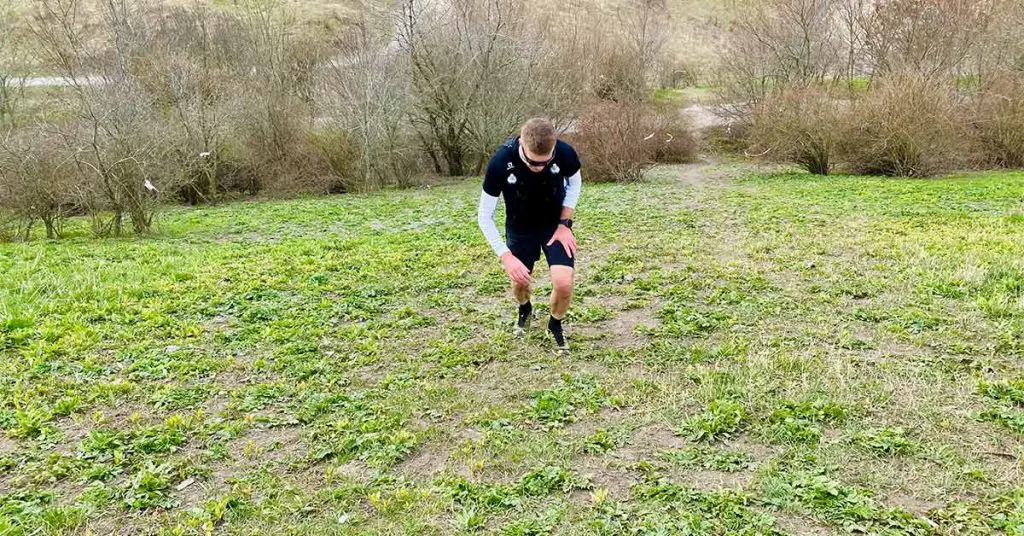Estimated read time: 8 minutes.
If you are reading this article, you probably signed up for an upcoming marathon event, but you haven’t trained for it, or you need tips on how to participate in a marathon without training. Either way, you have made the right decision coming to this page.
Marathon events attract people of all ages, genders, and goals. It is one of the popular achievements every runner wants to tick off their bucket list goals. However, like any other sport, some people find it hard to save time from their busy schedule for marathon training. That’s why most people often ask whether one can run a marathon without training.
Yes, you can run a marathon without training, but only if you are a long-distance runner. However, for ordinary people, it is not possible to run a full marathon without proper training. Taking this can lead to severe mental and physical injuries as well as slow recovery. To run a marathon, you must train properly for at least four to six months.
As you might be aware, marathon training is intense and time-consuming. One must be committed, available, and willing to sacrifice a good amount of time on the race course training.
Going forward, we’ll discuss the consequences of running a full marathon without training. We will also look at what marathon training entails, the right training for long-distance running, tips and strategies for running a marathon without training, and more.
What is Marathon Training – Is it Different from Others?
As earlier mentioned, training for a marathon entails many things, including endurance, discipline, physical fitness, and passion. The right training will help you to increase your heartbeat rate and the ability to save enough energy to complete your race. You train your body and mind to push their physical limits to achieve results.
Nevertheless, you should understand that marathon training differs from half marathon training. The training that half marathon runners take cannot enable them to complete an equivalent marathon time if asked to. Their bodies are trained to store enough energy to take them for a half marathon.
Marathon training involves long runs that help you to burn extra fats and maintain strong muscle strains that will endure long miles.
Basically, the right marathon training involves the following:
Cross Training
The best way to improve your body’s physical fitness level is by cross-training. This involves low-impact aerobic exercises that will enhance your heart rate. The best-recommended cross-training includes walking, hiking, cycling, trail running, and others. As much as these simple exercises keep you fit, they also help you in handling managing endurance events.
Strength Training
Strength training is essential in building your muscles and enhancing your overall performance. You can hit the gym and train using dumbells or exercise with your own body weight. The right strength training exercise should help improve your core, legs, hips, and glutes.
Long Runs
Full marathons require good stamina and mental toughness to endure many hours of running. This is why long runs must be included in marathon training. Most people practice long runs on a weekly basis to gain the speed they need to reach the finish line.
Resting
Every runner must get some days off the training schedule for resting before the race day. Also, it is recommended for runners to take at least one rest day per week. In this case, resting means no workouts at all. Many people choose to sleep as it helps the body and mind to relax and recover.
Tapering
Tapering is a vital element when training for full marathons. It is recommended to reduce your mileage at least two to three weeks before the full marathon race day. This will give your body enough time to store energy and recover.
The bare minimum training should be 16 to 20 weeks if it is your first marathon. A person who is fairly fit should take around ten weeks to be fit for a race. Additionally, it is recommended to train a minimum of three hours straight before the main event. The average distance you should cover during your training must not exceed 22 miles.
Best Tips and Strategies for Running a Marathon Without Training
If the marathon race day is approaching, but you haven’t trained for it, we’ve got you covered. It is essential to understand that a full marathon race takes 7 hours before the course is closed. This converts to running 16.01 minutes per mile on average.
Our top tips and strategies will provide you will everything you can do to enjoy running a marathon without training. So this is what you can do to get that marathon medal without training for it:
Get a Mantra
If you are going on a long-distance race, it is important to find a mantra to encourage you along the way. Make sure you repeat this mantra to remind your brain that you can make it. Some of the common mantras you can use are; “Be strong. Be bold”, “Get it done,” “You’re stronger than this hill,” and many others.
Have a Hydrating and Fueling Strategy
Running a full marathon is not a joke. Your body will be dehydrated and exhausted. Take advantage of the provided hydrating and fueling stations to drink water or an energy drink every 5 kilometers or more. If you’re not after winning the race, you can stop and eat something along the way.
Invite a Running Partner
If you are running a marathon for fun only, you can invite a company of friends to join you. This is a great motivational strategy as it will help you run at a good pace to make stories. Also, you can join other runners to support you complete the race.
Walk on Hills
If the race course has hills, it is recommended to walk them. This will save you the energy to excel on flat land. Also, if the terrain is uneven, you should watch out for sharp stones, rocks, and logs. This will reduce the risk of getting a sprained ankle and other injuries.
Distract your Mind
If you are on a solo mission to run and complete a marathon, you must get a good mental distraction. The best option is listening to music or a podcast. This will prevent your mind from the long distance ahead of you.
Wear Comfortable Gear
Make sure you get comfortable gear based on the weather condition. The vital thing to keep in mind is your running shoes. Wear a pair of shoes that fit and one you are used to. Avoid the tendency to buy new shoes unless you don’t have a good one.
Get Enough Sleep
It is recommended to get to bed early before the race day. This will help you to get enough rest for the heavy task ahead of you. Also, you need to wake up early enough to get time for refreshing, taking breakfast, and driving to the marathon venue.
3 Post Marathon Running Tips
If you manage to successfully complete running a marathon, there are some do’s and don ts you must consider.
- Never Sit Down After a Race: Try not to sit down immediately after running a marathon. You should walk, stretch, or stand for about 30 minutes before sitting.
- Do Selfcare: Your body requires a good treat after a marathon. You should get a massage to help your muscles to relax and recover from the stressful running.
- Do Exercise for 2 to 3 Days: Your body will hurt after a full marathon. The best way to reduce this pain is to maintain exercise for the next 2 or 3 days.
Recommended Diet for Marathon Running
Runners are supposed to eat an excellent meal to provide them with all the nutrients they need for the race. The meals should be rich in carbs and fats for maximum performance. You should try eating the following before, during, and after running a marathon:
What to Eat Before Running
Choose a meal that works best for you. You can try out different foods during training to know the one that doesn’t affect you. This meal must be eaten 30 to 60 minutes before running. Your breakfast can include banana, peanut butter, jam, sports energy drink, etc.
What to Eat During the Race
Full marathons have aid stations where you can stop and eat, drink, relax, or take a short call. These stations are equipped with different light meals like sandwiches and cakes and drinks to keep your body hydrated and energized.
What to Eat After a Marathon
Your body will be begging for food after completing a marathon. Make sure you eat an efficient recovery snack to boost your carbs and protein levels. Also, regular sips of water will help your muscles relax and recover quickly.
Dangers of Running a Marathon Without Training
It is obvious that you put your body under stress and pain when you run a marathon without training. The consequences can be severe depending on your health condition. Whatever reason you have for not training will not substitute the pain you will go through. Maybe you are running to prove a point, but you later realize it’s not worth it.
Here are the health risks you pose to your body for pushing it to the limit without the proper training:
Takes Long to Recover
The advantage of full marathon training is it helps your body to absorb the shock and stress of a 26.2-mile long road. Your body fails to be efficient without training, and it might be hard for it to fully recover from this kind of damage.
Risks of Getting Hurt or Injured
It is estimated that 50% of regular runners often get hurt every time there is an event in the US. Most of these injuries are caused by overuse injuries. If a trained runner can suffer injuries, what will happen to someone without training?
You Hit the Wall Early
Another risk of participating in a marathon without training is you will hit the wall early. This means that your glycogen stores will dry up, and the body will shift to other energy sources. Most runners hit the wall at the 20-mile marker or even earlier if their body is not efficient in conserving energy.
Mental Damage
Marathon training improves a runner’s mental fitness. You must be creative enough to keep your brain as active as possible. Some people listen to podcasts, favorite music, or anything to help the brain to forget the pain your body is undergoing. Without mental toughness and preparedness, you can not go past 10 miles.
Health Risks
There are many health risks of running a marathon without training, and it could get even more severe depending on your fitness. These health risks are stress fractures, muscle strains, tendon ruptures, dehydration, plantar fascitis, shin splints, and many others.
Can I Run a Marathon Without Training – The Wrap!
To sum up, you can run a marathon without training, but as you can see, the consequences are horrible. Even the tips we’ve shared must be used with caution because your body will be put in a stressful situation.
Therefore, it is vital to train before registering or participating in any marathon. Training prepares your body and mind for whatever you are going to experience. However, training is not for the faint-hearted. You must be disciplined, committed, and ready to sacrifice a good amount of your time to step to the finish line.
- How Many Laps Around a Track is a 5K: Your Guide - October 22, 2023
- When is Track and Field Season? - October 22, 2023
- Understanding the Length: How Long Is a Running Track? - October 22, 2023




